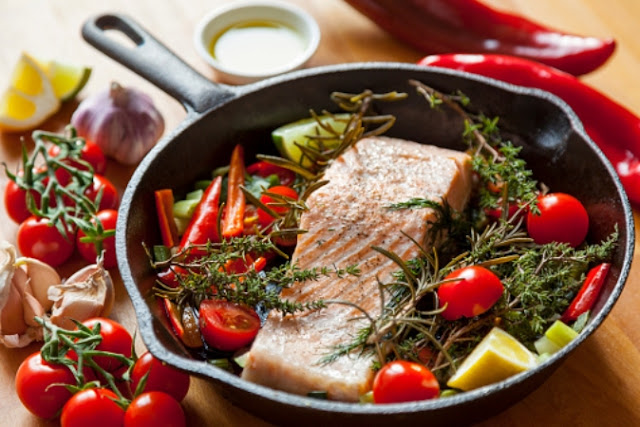Mediterranean diet
If there
is a diet that never goes out of style, it is the Mediterranean diet.
This is
largely because the Mediterranean diet is more than just a diet, it is a way of
life.
People
living in Mediterranean countries are known to focus their diets on fruits,
vegetables, whole grains, healthy fats, and other healthy foods. They also make
exercise a substantial part of their day and spend a lot of time with friends
and family. Known for its beneficial effects on heart health1, its protective
properties against chronic diseases2, cognitive function and brain health3,
diabetes4 and arthritis, 5 the Mediterranean diet is perhaps one of the
healthiest in existence.

In fact, it
is consistently ranked as one of the best diets by the U.S. News and World
Report, and has been listed as the best overall diet for 2020.
To learn
more about the Mediterranean diet, we've rounded up some of the best
Mediterranean diet bloggers to ask why they live the Mediterranean lifestyle
and how you can do it too.
Suzy
Karadsheh: the Mediterranean dish
Suzy
Karadsheh shares simple, healthy, and perhaps most importantly delicious and
satisfying recipes on her blog, The Mediterranean Dish. Their wide range of
recipe types includes classic meat and potato dishes, soups, hummus and dips,
dips, homemade pita bread, skewer variations and more.
"I was
born and raised blocks from the shores of the Mediterranean, and eating the
Mediterranean way is all I know," says Karadsheh. "While many 'diets'
in the common sense of the term are rooted in the very smart and joyful way of
eating that celebrates healthy food, maintaining a strong emphasis on great
taste, sharing with loved ones and having fun. From the table . "
Karadsheh
also has a helpful Mediterranean lifestyle information center directly on her
blog. She explores the recipe archive, plus tips on getting started with the
Mediterranean diet and how to get the most out of it. She also sells spice
blends and original Mediterranean ingredients through her digital storefront.
How does the Mediterranean diet compare to
other diets?
Lemon and
Olives was created by Kenton and Jane Kotsiris, a dynamic couple who have
created hundreds of Mediterranean recipes. Some of these recipes come from the
Greek Kenton family, while others derive from his travels to Greece and
inspiration from other chefs.
One thing I
love about Lemon and Olives is that they title all their recipes with
traditional Greek and translate them into English as well. For example, in
Lemon and Olives, you will learn that a lemon cake is called
"pantespani" and that the Greek phyllo meatloaf is called "kreatopita"
(the miniature versions are called "kreatopetes"). To round out the
impressive collection of recipes, Lemon and Olives also offers some helpful
(and delicious) cooking videos.
In addition to their many recipes, Kenton and
Jane also share information about the Mediterranean lifestyle, Greek culture,
travel, coffee, and interesting information about the Greek lifestyle, such as
Ouzo, the famous Greek snack.
Lemon and
Olives is also a shop with adorable Greek-inspired coffee mugs and other
goodies.
Tips for eating well
At Eat
Yourself Greek, Eugenia Makrogianneli shares Mediterranean recipes with an emphasis
on the collection of family recipes and believes that “food and drink in Greece
is your essence; it is the social mana of all interaction.
That is to
say: in Mediterranean countries food is more than food. This is why she
receives so much attention: sourcing fresh ingredients, incorporating tasty
spices, and using locally grown ingredients are pillars of Mediterranean
culture.
Makrogianneli,
who has been blogging for her Eat Yourself Greek since 2014, has won multiple
awards for developing her recipe, including an Editor's Choice and People's
Choice award from the prestigious Greek food magazine Vima Gourmet.


